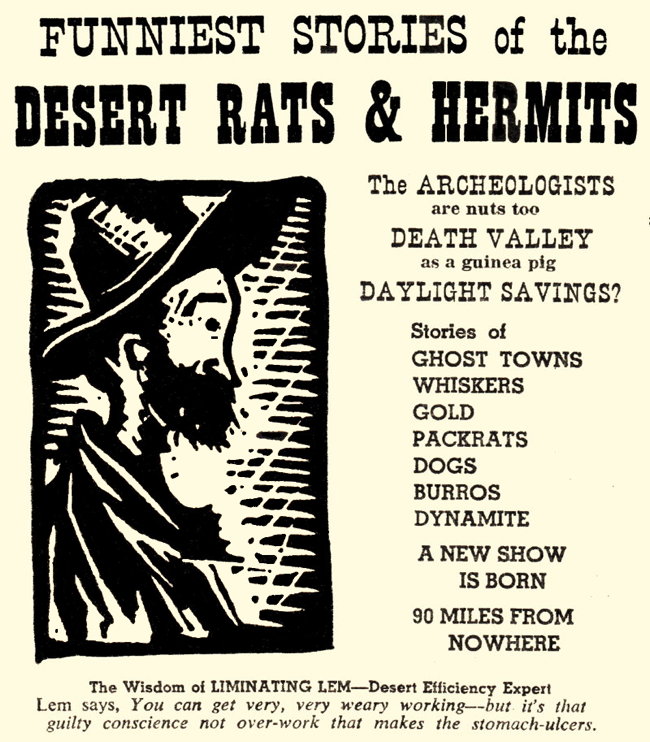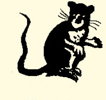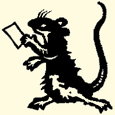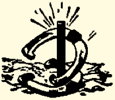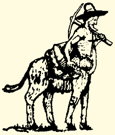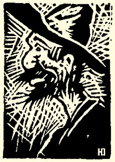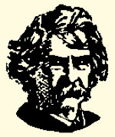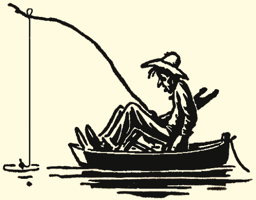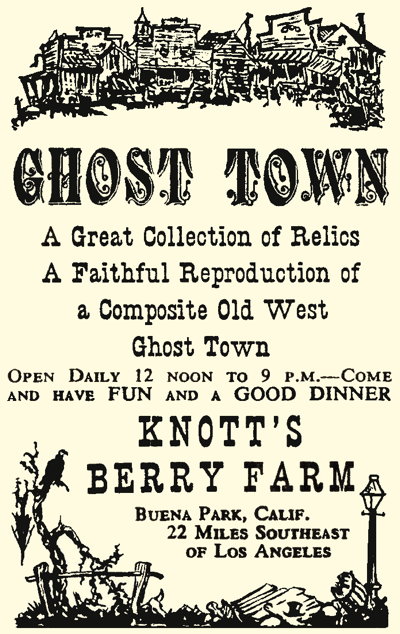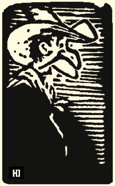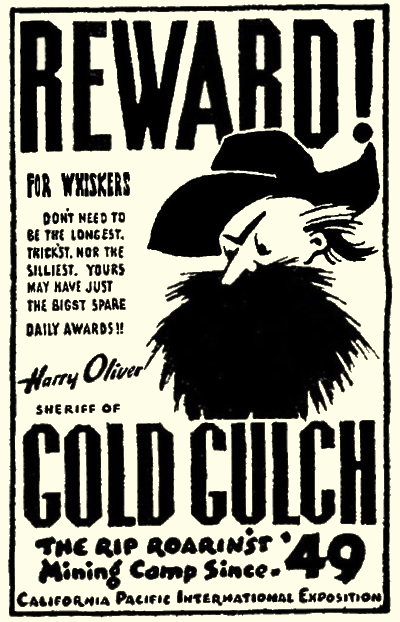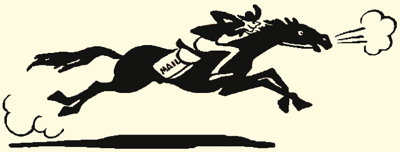BACK HOME COVER THIS IS HISTORICAL INFORMATION ONLY
PRICE 10 CENTS . . . . . . . ONLY ONE LOUSY THIN DIME
PACKET THREE OF POUCH FIVE
DEATH VALLEY & NEVADA PACKET
PUBLISHED FOUR TIMES A YEAR
ONLY NEWSPAPER IN AMERICA YOU CAN OPEN IN THE WIND
Harry Oliver's DESERT RAT SCRAP BOOK2
Smallest newspaper in the world and the only 5 page one.
Packet 3 of Pouch 5
![]()
This paper is not entered as 2nd class mail. It's a first class newspaper.
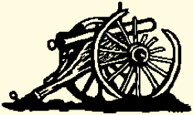
You folks don't pay enough attention to the RED "X" when your subscription runs out—so from now on you get hand painted red "Xs."
• • •
This newspaper is quoted more than any other newspaper in the Salton Sink.
• • •
This magazine will not raise in prie as long as Bull Durham stays at 5c.
|
THE MAIL |
My Old Friend Bill:
I stopped at Little Lake in the lave beds of the Mojave Desert to see my old friend Bill—Bill is 12 years old and looks fine, a handsome shepherd dog of abnormal size. His Honorable Discharge hangs on the wall and you can read—Enlisted Feb. 24, 1943—Discharged March 12, 1946. Service—Sentry Duty in the South Pacific.
Bill like MacArthur was built to be tops.
DEATH VALLEY
AS A GUINEA PIG CALLING DOCTOR GOODWIN
On page 4 you will find I have reprinted "NO MORE FRONTIER" by Bill Nye, first printed in 1886. Bill didn't like the peach cans and beer bottles on the streets of mining towns. I know T. R. Goodwin, Superintendent of Death Valley National Monument, will be glad to read this and I am glad that I can give him some help in stopping this "spew" of so-called civilization."
I pass on two suggestions that came to me a few weeks ago on a trip to Borego Desert.
Number One ame from P. W. Ensign, rancher and date grower of Borego. Mr Ensign knowing my dislike of bottle strewn roads, asked me why I did not tell the Brewerys advertising beer on T.V. to quit emphasizing "THROW-AWAY" and say instead "time-saving" bottles or cans. NOT MAKING LIKE YOU MUST THROW THEM.
Number Two was more than a suggestion, it was a sure remedy. Bill Mushet of the Banner Queen Ranch Trading Post will not handle beer in cans or "throw-a-way" bottles. His dislike of these highway mess-makers just makes him charge for bottles so they won't fling them away. (Beer in returnable bottles only).
Number Three is my suggestion to you, "The Wizard of the West's Wonderland of Desert Scenery"—yes, you Mr. T. R. Goodwin—you and only you—if you will you can start this great move and you should, first you will ask everyone in your Empire to sell only beer in returnable bottles and charge 5c for the bottle (at 5c and empty your cleanup men won't find many—highway combers will get to them first). Next Mr Gooodwin you give this idea lots of publicity, then you ask Senator Brown of Shoshone, the Boys at Baker, Beatty, Trona, Ridgecrest, Bishop, etc. to only handle beer in returnable bottles and first thing you know there won't be any cans or bottles along the highways.
[ REMEMBER ]
The Brewerys know their beer is beteter when in the bottle they made famous.
To you readers that take pride and have good taste in what you eat, smoke, and wear please remember—no first class cafe or fine host would dare serve beer in throw-away bottles or beer in cans.
At a "Sneak Premiere" of this editorial, my good friend P. E. Rogers of Stove Pipe Wells Hotel, said, "We are starting today—'
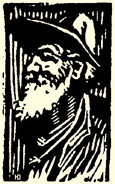
Your REWARD Mr. Goodwin
paid in advance
Your Editor is working with Captain Catnip Ashby to develop a worm that will eat the troublesome kleenex that wraps around the weeds, the Captain, says, he has a worm that he has imported from Tahiti that will eat the kleenex after it has been sprayed with Vanilla, but, says, the Captain, the trouble is so will the Rangers.
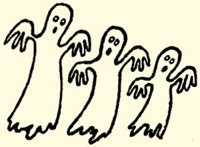
THE GHOSTS OF OLD
VIRGINIA CITY
Virginia City Ghosts are different, says, Paul Smith of the Museum of Memories. Telling of the ghost of an old Doctor that steps out on the stage at Piper's Opera House at 13 pulse beats after midnight every Friday the 13th and asks "IS THERE A PATIENT IN THE HOUSE?"—H.O.
My Dog Whiskers
The best dog I ever worked for

John Hilton the desert artist recently stopped by the place and I happened to be in the middle of calling down my dog Whiskers for being too nationalistic. Every time a car load of my Mexican neighbors stops in front Whiskers barks like everything. John said I shouldn't feel bad because south of the border dogs bard at Americans day or night no matter how they are dressed. The cusses just seem to know we don't belong there.
Now I'm gonna make history in canine psychology. Were heading Whiskers across the border and see if he turns around and starts barking at me.
WIDE HORIZONS
Incidentally the Hiltons are very happy in their Twentynine Palms home. Barbara was heard enthusiastically describing the place to a friend the other day and got carried away a bit. Says Barbara Hilton, "See the Sheep Hole Mountains over there and there are the Coxcombs the Pintos, the Bullions and even San Gorgonio. Why we have an unobstructed view of three hundred and sixty-five degrees."
Most of my stuff is too good to be true 3
NUTS TO
DAYLIGHT SAVINGS
Says this RAT
Your Editor has long been against this "daylight savings" here in the Desert where we get too muh SUN, that hour in the cool morning is ideal for the family, a chance to brace for the hot day at work and at school.
During our hot 5 months of summer one must wait till the 8 o'clock "cool" to eat a pleasent meal, if one works he is off work at 4 o'clock, really 3 o'clock, just time enough to get all slopped up with beer ,the worker has 5 hours before time to eat, he's spoiled, tired from a night's rest disturbed about the time the room was cool enough to sleep, I say, we just turn the clock the wrong way, I ask you to remember how nice it is each year when we come back to standard time.
My dog "Whiskers" was in a bad mood for four or five weeks after both switches this year, and my cat "Sin" ain't straightened out yet — and the Widow Winchester of Indian Wells, said, shaking her finger at me, "Tell them they would all do well to live on 'GOD'S' time."
I was glad to pick up a book and get the low-down on this daylight savings foolishness.
The book is just off the press—
A Little Treasury of
MAIN STREET U.S.A.
Selected by
JOHN M. HENRY
From the wit and wisdom of
America's country editors
$3.00 The Vanguard Press, Inc.
The light on daylight-saving is on page 42—
Daylight-savings idea comes from an old Indian who cut off one end of his blanket and sewed it on the other to make it longer.
Clarke A Sanford
Catskill Mountain News
Margaretville, N. Y.
The book has 100 pages of reprints of the best of Wit and Wisdom of America's Country Editors (I am on page 21 and 87).
You will remember JOHN M. HENRY'S Main Street page in the "Cosmopolitan Magazine."
•
Dry Camp Blackie, says, morning is the wrong time to start a day anyway.
![]()
"The minute a thing is overtragic it is funny." —Charlie Chaplin
• • •
"Humor is telling the exact truth, then going one step farther."
![]()
THE MAIL POUCH
Spooky Bill's Requiem
Spooky arrived in or diggings one sizzling afternoon: Herded fleet of burros over to the little knoll we used for a cemetery: Constructed camp by throwing a blanket over a scrawny ocotillo.
While the burros rolled in the hot dust; Spooky dug from a kayack a rusty jews' harp. Reclining himself in the four by six foot patch of shade beneath the blanket, he proceeded to pour from the harp a dirge so loaded with melancholy that a flock of buzzards soaring over his camp shed so many tears that by sundown the resurrection flowers were in full bloom all over the knoll.
All of which was most unusual around our neighborhood. That evening some of us strolled over to the camp to see what sort of character the newcomer was.
Said he, "For the past year and eighteen months I've been working in the Coffin mine, in the Funeral range, overlooking Death Valley. I was working grave-yard, drilling in the morgue stope; the white ghost was my chuck tender; shift boss, was the waking skeleton from Tombstone. One night we drilled an unusual number of holes, loaded them to the collar, pointed the fuses toward Ludlow, and here I be. When I saw your little bone-yard here I just naturally gravitated into it."
Dear Oliver: Over here we consider your Desert Rat Scrap Book, the official Bull-a-tin of the order of Decrepit but Jolly Desert Rats. We have never seen the above bit of witticism in print. It is not original with me, but has been running around the desert for generations. Mayby-so it is suitable for your use, maby-no. the old time desert miner—the ones who wandered from camp to camp with a string of burros—when quitting a job, wold use the expression, pointing the fuse, to indicate his intended destination.
Ed. Rochester Winterhaven
Your Editor had a lot of fun with a Burro-Flapjack Show at Stove Pipe Wells Nov. 9 and 10, 1952.
Mat Weinstock, in The Daily News L.A told it with the brevity this paper likes.
Desert Rat harry Oliver is always cooking up something different to glamorize the desert. This time it's a burro-flapjack sweepstakes Sunday near Stovepipe Wells, as part of the Death Valley '49ers encampment. First prospector to pick a site, unload his burro, lay out his camp, start a fire and flip a flapjack wins.
As Chairman, I worked out some rules, got an O.K. and some praise from HOOFS and HORNS the Official Publication of The Rodeo and Cowboys Association of America.
Quoting from L. Burr Belden of San Bernardino SUN.
The sweepstakes finals turned out to be something of a nip and tuck affair between bearded Les Spell of Twenty-nine Palms and even more bearded Hugh Cooper of Apple Valley. Spell won firsts in all preliminary heats and stood first in the packing contest finals with Cooper in second place. In the flapjack finals Cooper edged out Spell by a flip.
Take Third Places
Mont Miljan of Red Mountain was third in packing while Red Ray of Ridgecrest was third in the flapjack test
The burro events drew a phalanx of bewhiskered desert rats from many spots in California and Nevada and tall tales of 50-year-ago strikes at Greenwater, Esmeralda and Tonopah were passed back and forth around the campfires as the prospectors shunned anything as modern as cabins and made their beds under the stars near the sand dunes.
"Seldom Seen Slim" of Ballarat who has prospected the Panamints since around 1890 charged someone did him dirt in the preliminaries by swapping burros on him and giving him a balky critter. Slim won the consolation prize but was a bit unhappy over it and packed back to Ballarat without waiting for the finals.
Osdick Declines
Pete Osdick, discoverer of the rich silver lode in the Rand district, resisted efforts to have him demonstrate his skill at burro packing. Pete claimed his 79 years entitled him to just watch. W. S. Ritchie of Rialto, who packed into Death Valley and prospected there in 1907, was also a kibitzer.
These Old Time Prospectors made the show a big sucess.
BILL HIGDON of Knotts Berry Farm
LESS SPELL of 29 Palms
HUGH COOPER of Apple Valley
ON-THE-ROCKS MACK of Barstow
CHARLEY BISHOP of Atolia
MONK MILJAN of Red Mountain
"BUFFALO BULL" MAXWELL of Johannesburg
ED KIRKLAND of Randsburg
WALT THATCHER of Inyokern
RD RAY of Lone Pine
ARNOLD FRYCK of Las Vegas
SELDOM SEEN SLIM of Panamint
—All I got to say is these speed-demons ran a 100 yard race to make camp, start a fire, mix and cook a flapjack in about one-half the time it takes a modern house-wife to park her cigarette and find the frying pan.
Show to live on
As it is my hope to keep this show alive glamorizing the Burro, Prospector and the Desert, as the Rodeo has the Cowboy and the Sportsman has the traditions of archery. I will be glad to foreward the rules to organized groups planning such a day of Desert festivity.—Your Editor
![]()
SQUAW WOOD
The chance of getting a straight flush in poker is one in 62,000.
• • •
Indian eating with his knife said, "The fork she leaks."
• • •
Seven-eighths of the fun of smoking is seeing the smoke.
• • •
The largest gold nugget ever found weighed 630 pounds.
• • •
Humor, like history, repeats itself
![]()
Jake Topper, says, "If you go to sleep or get sleepy while driving your car—why, for safety, just take your shoes off and you will stay awake.

PACKRAT'S DYNAMITE & EARTHQUAKES
It's like this, Dry Camp Blackie's mine was peter'n out, lots of work and not much gold, then one day Blackie went to a newly opened box of dynamite to find 3 sticks gone and 3 pieces of rich gold ore replacing them. Blackie got out his kit to find there was more gold in those 3 pieces than he had mined in the last 3 weeks, so Blackie opened 3 more boxes of dynamite, 3 weeks later the dynamite boxes were empty of dynamite but Blackie loaded his burro with his rich ore and headed for the Mojave ore market.
As he was headed down the trail that Tehachapi earthquake hit and Blackie looking back saw his mine and the hill for a quarter of a mile around popping like popcorn — the bouncing rocks touching off the rat's loads, Blackie says, after he gets over this—his laset big drunk—why, he's going back and see if those packrats put their dynamite in the right places.—H.O.
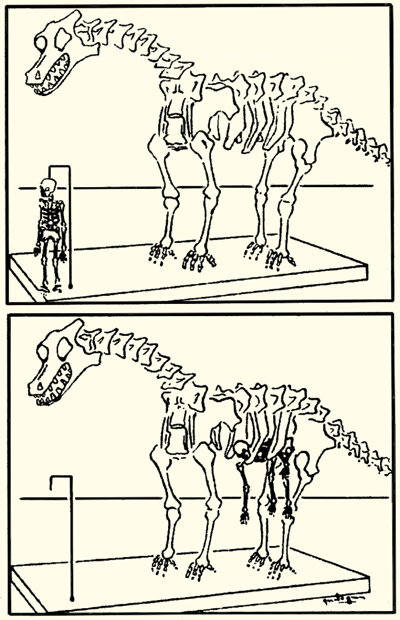
Just an Archeologist where he belongs.
As a special treat, a teacher took her class to visit the museum of natural history. The children returned home very excitedly, and rushing into his house, one of the little boys greeted his mother exuberantly, saying, "What do you think we did today, Mother! The teacher took us to a dead circus."
![]()
I believe that today is the best day since yesterday and that tomorrow will be a better one.
![]()
Up With the Stars
One of the nicest gestures I know was made in Old Goldfield. It's the story of a much loved Doctor that passed on at about the time Goldfield faded as a mining town.
The few not too prosperous citizens that laid the good doctor away, had no way of marking his grave in the manner his unselfish life so richly deserved, they didn't do too badly—his sign was used as a headstone.
DR. HOMER ROGERS
Up Stairs
![]()
Nature is stronger than education.
• • •
Nowadays we wind the clock, put the cat out, and have one last look around for flying saucers.
![]()
PAY DIRT
A night watchman heard noises in the dark mine. Drawing his revolver, he went into the shaft and called:
Come out with your hands up, so I can see who you are. If you don't, I'll come in and see who you were.
![]()
The United States Treasury has recently dug a big hole down in the hills of Kentucky and buried our gold in it. The next you know they'll be moving the mint down there to have it near the juleps. Gee what won't come into your mind when the thermometer shows 121 degrees?
![]()
Wit consists in knowing the resemblance of things which differ, and the difference of things which are alike.
SHOSHONE MINNIE'S FIRST AID KIT
A Report to the Medical Profession
By HARRY OLIVER
This story has never been printed before and wouldn't be now only for all this Blood Bank, First Aid talk and Atomic doin's. We folks out here in the desert have learned some out of that Red Cross First Aid Book, and my thinkin' that maybe there's an idea in this yarn that might help the medical profession is why I'm tellin' it now.
For years, on Christmas day, Minnie had been comin' here to the Shoshone store and Post Office and always she gets a big box that's come all the way from back east in Boston, Mass. It says on the box from Dick Van Osten, Back Bay, Boston, Mass., for Shoshone Minnie, Shoshone, Death Valley Jct., California.
Minnie is fat and old today, she gave birth to eleven Indian babies in her years of bloom. When I first saw her back in 1918 she was volupchus (that stuff they call oomph now).
But here is the story. Back in August of 1918 a party of 3 (two sellers, one buyer), stopped here on their way into Death Valley to look at a piece of mining property, filled up their canteens and took a 5 gallon can of water for their car. They told the storekeeper that they knew where they was a goin' and would be back next day.
Well, they didn't come back and the evenin' of the following day Toad Watson (deputy sheriff) gets in his Model T with Mac the clerk of the store and starts trailin' their car. It's next mornin' when they come onto the party, crazed with the heat, lips swollen, stumblin' down a dry-wash, eyes burnt and glassy.
Toad gave them each a bit of rag, jest moist (not wet), loaded two in the back seat with Mac between them to keep them from bouncing out, he watching the young feller from Boston aside him. Then he hit for the road, aimin' to get to Shoshone via Jubilee Pass in a coupl'a hours.
With help, the three victims were laid out in the shade of the open barn as scalding hot coffee was given them—a tea spoon full at a dose.
Indians stood around in the outer shed to watch. Toad Watson gave orders and the three men lay on their beds of baled-hay, mumbling and moaning for water.
Young Dick Van Osten swallowed his spoonfull of hot coffee begging for more, then his glassy eyes turned to the Indians close by, Minnie was trying to coax her over-fat baby to nurse from her generous, moist breasts — young Dick Van Osten's Boston bringing up vanished—crazed with a burning, flickering, head of hellfire — he bolted for Minnie.
Toad Watson was for dragging him away—but Old Indian John getting up from his seat on a bale of hay, said, MUCH GOOD—GOOD FOR 'EM—UNBURN-EM EYES—NO STOP 'EM.
Dick Van Osten's eyes did clear up days before the other fellows. So, I thought the medical profession should know all this. The secret is 34 years old.
•
Perhaps I am a thousand years late, old prospector Cabot Yerxa (Alaska 1900) Desert Hot Springs since 1913—told me after reading this, that the Eskimos used mother's milk as their only relief from the eye pain of snow blindness.
This is sure an intimate paper about Desert People and their intimates.
![]()
QUICKSILVER HUMOR
No intoxicating drinks sold to intoxicated people.
—Sign in El Charro Cafe Indio, California
• • •
Probably the world's greatest humorist was the man who called "installments"—easy payments."
• • •
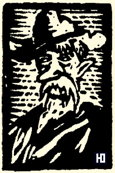
Ol' RIP SNORTIN' complains that he is having trouble finding a "competent" doctor; the last three who examined him have ordered him to quit drinking.
•
Rip says he's got an uncle with a wooden leg that drinks. He says — it don't take the paint off it any neither.
4 DEATH VALLEY & NEVADA Packet
This page is dedicated to the World's Greatest Optimist--the Desert Prospector
NEVADA
THE WEST'S MOST WESTERN TOWN
90 miles from nowhere
Stevens Gaugh Reports o a Nevada Oasis
We are back in Beatty, Nevada, again for the fourth time; pulled into the only trailer park here day before yesterday and set up by one of the big poplar trees, for which this great oasis of the desert is well known. The Amargosa River comes to the surface here, which otherwise, and elsewhere runs under ground—a small stream of water in the desert is called a river because it looks so big in the parched and barren desert a hundred miles around here. It is enough water, however, to make a green spot in the wastelands, and make the desert bloom; and to make Beatty one of the greatest of Oases. There isn't a town of any size within 90 miles of Beatty in any direction, and it is about as far removed from civilization as anyone an get in U.S.A. There is one general merchandise store and a grocery here; two garage, and three filling stations; two hotels, and five motels; three cafes; a rock shop; and five saloons and gambling halls, and a sporting house to accommodate the tourist, miners, sheep-herders, and cowboys from a few ranches and two operating mines. The tourist business is the main source of income, so the numerous gaming and bars. I'm the sign painter around here and these parts, including Death Valley, and carry all materials required and equipment in a ¾-ton International Truck and 14 foot house trailer. My wife travels with me, and is titled "The Lady Sign-Painter," here-abouts. We know just about everything goes on here, and in Death Valley, as Beatty is our headquarters, and Beatty is the main Gateway to Death Valley.
We've been getting the news since we arrived day before yesterday, and that's about all we could do before getting to work because everyone was chuck-full of news. Seems like a lot of things happened since we left, and we should have been here to see the excitement.
An Indian killed a deputy sheriff at Tonopah, 93 miles to the north, and headed straight for Beatty with a posse on his heels. He had the deputy's geared up car and they could not catch up with him. Just about the same time as the murder, a highway man held up a gambling hall in Las Vegas, and about the same hour of the same day, he too, started for Beatty, but in Vegas they didn't know which way he went. The bandit's description was broadcast on the radio, and at the same time the telephone wires were busy to beatty telling of a murderer coming this way from Tonopah. A pretty young lady stopping at the Beatty Hotel suddenly realized that she had been drinking coffee with the Las Vegas bandit, and he had gone up to bed. Excitedly she rushed out of the Hotel to get the sheriff's deputy or town constable at the very same moment the murderer arrived from Tonopah in the deputy's hopped up car with the siren going, and coming aout 90 miles an hour right down the one block of main street. She thought it was the deputy, so ran out into the street waving her hands, and screaming for him to stop, but the murderer wasn't interested in pretty women just at that time with the posse right on his heels, and bullets hitting his car. They went on through town like a bat out of hell, banking away, until about five miles south of Beatty. A truck driver saw all the rumpus coming his way and moved his big gas tanks across the highway so none could pass, and the murderer saw them, stopped and jumped out and took to the desert a foot, but that was the end of him too. All these goings on in civilization's end up in Beatty, 90 miles away, and it's not the first time, neither, nor will it be the last time criminals find their doom at Beatty. There's gun toting law man here that always get their man.
'There's no community, no matter how small and how little support it gets from the civilized world that can let children go hungry with their Ma and Dad, and Grandma, too; so, they got to feed them, give them gas, and send them on back into civilization where they got relief in such cases, but in Beatty, there's nothing but the collection box, and it goes around just about every day for some "Poor Family," or other good cause.
The last donations had to be made to build a fence around the grave yard, and for very good reasons. People of Beatty had just buried on of their own townsmen, gave him a good burial, and put flowers and a big wreath on his grave. The very next day a donkey walked up the main street with the wreath around his neck. An investigation revealed that the burro had eaten all those flowers, but had somehow got the wreath over his head. So the collection box goes the round again for the fence. That must never happen again to our own beloved.
So it's a collection for this or that regularly at least every week. Poor fellow tried to hang himself in the Beatty Hotel room because he not only lost his money, but lost his girl, too, and "got nothing to live for"—so, the big hearted folks of Beatty got to do something 'bout that. A woman comes to town and gets right out in the middle of the short main street with some sort of "fits' she is having, and there's another collection. A couple little children get burnt in a fire badly and need expensive skin grafting, and hostital, and doctors, but this time it's no collection taken up for them, mason jars are put on every counter and bar for donations, and kept there till there's enough money to take care of these kids. Then ther're the movies, because there's no theatre here, so no movies for the kiddies, big ones and little ones—therefore, the movies are on a cooperative basis. The town hall needs a painting once in a while, and has to have screens, and a fixing up now and then. When things have to be done around Beatty, people here just pitch in nickles, dimes, quarters, dollars — whatever they can and feel like giving.
That's how they do thing around Beatty, but maybe that's because it is so far removed from civilization the people don't realize the goings on in those towns 90 miles or more away; and that hunger unemployment, sickness, sorrows, and struggles in poverty are part of the world so far away. But when things like that come to Beatty something should be done about them.
There're good hot springs just a short distance from Beatty, where a fellow can take a good hot bath in curative mineral waters, and it's a good healthy climate where one can rest and recover from the ills of humanity. So if you want to get away from it all for a while, come to the West's most Western town—90 miles from nowhere.
—Stevens Gaugh
This is a Mark Twain item that should be in your scrap book. It's been in mine for 30 years.—Ed.
"My Dear Sir: I thank you very much for you letter and the photograph. In my opinion, you are certainly more like me than any other of my numerous doubles. I may even say that you resemble me more closely than I do myself. In fact, I intend to use you picture to shave by.
"Yours thankfull,
"S. CLEMENS"
![]()
SHAME ON YOU, PAL!
JUST A BONE IN OLD MINE
 SPRING CITY, Mo., July 24 (AP)—Workmen finally reached the bottom of an abandoned mine where a dog has kept a 25-day vigil and found nothing except a small bone.
SPRING CITY, Mo., July 24 (AP)—Workmen finally reached the bottom of an abandoned mine where a dog has kept a 25-day vigil and found nothing except a small bone.
The animal had maintained a watch at the mouth of the shaft since last month, refusing to leave. A newspaper named him "Pal."
Residents of this southwest Missouri community speculated that Pal's owner might have tumbled into the mine. The dog is a stranger in the neighborhood.
Volunteers spent the past week pumping out the flooded mine. Thousands of persons visited the scene, curious over what might be found.
Last night miners Ted Hymer and Oscar Uber were lowered down the shaft. After a thorough search at the bottom of the pit, they reported they found nothing—except the small bone.
![]()
On the Colorado River a mile and a half above Earp, California, Tommy Kinders an old-timer has a camp and at his camp most of the record fish catches during the last 20 years have been made.
Last summer a young married couple drove across the river from Parker, Arizona with their trailer just in time for the baby to be born in California.
The only scales the father could obtain on which to weigh the child was the one with which Tommy kinders had weighed all the big fish caught in the last 20 years.
The baby tipped the scales at thirty-five pounds.
TUMBLEWEEDS
We are trying desperately to return to nature which the wise animals have never left.
• • •
Old maids among the Navajos are very rare.
No More Frontier
by Bill Nye 1886
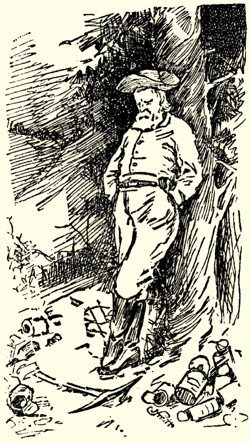 The system of building railroads into the wilderness, and then allowing the wilderness to develop afterward, has knocked the essential joy out of the life of the pioneer. At one time the hardy hewer of wood and drawer of water gave his lifetime willingly that his son might ride in the "varnished cars." Now the Pullman palace car takes the New Yorker to the threshold of the sea, or to the boundary line between the United Stats and the British possessions.
The system of building railroads into the wilderness, and then allowing the wilderness to develop afterward, has knocked the essential joy out of the life of the pioneer. At one time the hardy hewer of wood and drawer of water gave his lifetime willingly that his son might ride in the "varnished cars." Now the Pullman palace car takes the New Yorker to the threshold of the sea, or to the boundary line between the United Stats and the British possessions.
It has driven out the long handled frying pan and the flapjack of twenty years ago, and introduced the condensed milk and canned fruit of commerce. Along the highways, where once the hopeful hundreds marched with long handled shovel and pick and pan, cooking by the way thin salt pork and flapjicks and slumgullion, now the road is lined with empty beer bottles and peach cans that have outlived their usefulness. No landscape can be picturesque with an empty peach can in the foreground any more than a lion would look grand in a red monogram horse blanket and false teeth.
The modern camp is not the camp of the wilderness. It wears the civilized and shabby genteel garments of a sawed-off town. You know that if you ride a day you will be where you can get the daily papers and read them under the electric light. That robs the old canyon of their solemn isolation and peoples each gulch with the odor of codfish balls and civilization. Civilization is not to blame for all this, and yet it seems sad.
Civilization could not have done all this alone. It had to call to its aid the infernal fruit can that now desolates the most obscure trail in the heart of the mountains. You walk over chaos where the "hydraulic" has plowed up the valley like a convulsion, or you tread the yielding path across the deserted dump, and on all sides the rusty, neglected and humiliated empty tin can stares at you with its monotonous, dude-like stare.
An ole timer said to me once: "I've about decided, Bill, that the West is a matter of history. When we cooked our grub over a sage brush fire we could get fat and fight Indians, but now we fill our digesters with the cold pizen and pewter of the canned peach; we go to a big tavern and stick a towel under our chins and eat pie with a fork and heat up or carkisses with anti-christ coal, and what do we amount to? Nuthin! I use to chase Injuns all day and eat raw salt pork at night, bekuz I dassent build a fire, and still I felt better than I do now with a wad of tin-can solder in my stummick and a homesick feeling in my weather-beaten breast.
"No, we don't have the fun we used to. We have more swarrees and sciatics and one bloomin' thing and another of that kind, but we dont' get one snort of pure air and appetite in a year. They're bringin' in their blamed telephones now and malaria and airgue and old sledge, and fun might as well skip out. There ain't no frontier any more. All we've got left is the old-fashioned trantler joos and rhumatiz of '49."
Critics Don't Agree on What is Wrong With my Book . .
But they are sure talking—and the book is selling like hot cakes
NOT SURE
Desert Magazine—review June, 1952
I am not sure whether Harry Oliver is the world's greatest philosopher, the desert's champion humorist, the biggest liar who ever came through Buzzard Gap—or just plain crazy.
Randall Henderson, Editor
MORE DOUBT
New Mexico Magazine—review June, 1952
This printing, it says here, is a limited autographed edition of 2,000 copies. This reviewers copy is No. 18. But coming from Harry Oliver, it wouldn't be surprising if there were 5,000 of them—all numbered 18.
Geo Fitzpatrik, Editor
SPOOFERY
San Bernardino Sun Telegram—review April 6th
The book is not without liberal dosages of spoofery, as might be expected, from the title page which announces Oliver's life span as "1888-1999" to the oncluding epitaph which avers the trail-wise sage made the fatal mistake of walking behind a burro.
L. Barr Belden, Editor
MORE THAN CLOWN
Calico Print—review June, 1952
Because he is more than a clown, more than a smooth-quipping radio comedian, many of the bits in his book pack a lasting wallop. Try this one: Oliver says, he's fed up with radios. Says he listened to a preacher last Sunday who was talking like he thought God was 150 miles away. Or his famous line: "The wilflowers at Fort Oliver were so thick this spring you could hardly see the discarded beer cans."
Editors—Harold and Lucile Weight
MODESTY
Riverside Enteprise—reveiw May 16, '52
Modesty is something Harry Oliver never heard of but he doesn't talk much about his Hollywood days. The desert has always been his true love—maybe because it's something big enough and beautiful enough and picturesque enough that his homespun humor and tall tales will never seem out of place there.
Garland Griffin, Editor
DEATH FROM HIS OWN BARBS
The Indio Date Palm—review April 17, '52
The book, compiled by his daughters Amy and Mary, purports to give credence to rumors that Oliver is a ghost, and the first editions are autographed in "ghost ink" by the lamplighter, janitor, Fort Commander, publisher, editor, humorist pioneer, philosopher, showman, prospector, hermit and secessionist—all terms which Harry would have used to describe himself in the most modest terms.
Ole J. Nordland, Editor
HERMIT BUSINESS
Daily News, Los Angeles—review April 20
Harry Oliver, who is in the desert hermit business, has been put between covers by his daughters Amy and Mary—a book titled, "The Old Mirage Salesman." The material is from Harry's effervescent Desert Rat Scrap book as well as his Borrego chronicles from the now scarce Desert Rough Cuts, (1937). We believe Amy and Mary picked the best.
Matt Weinstock, in his Column
MIXED UP
Citizen-News, Hollywood—review May 2, '52
Harry got himself a rolltop desk with a lot of pigeonholes for filing things, but the pack rats rearranged things at night and got them in the wrong pigeonholes. That's why Harry's book seems a little mixed up.
Matt Weinstock, in his Column
ABOVE MEDIOCRITY
St Paul Pioneer Press — 2 page review May 18 with 5 pictures, yet.
Author who can neither write nor spell, soars to journalistic fame. This combination has raised Oliver far above the mediocrity of many writers. bit of his philosophy—"Never miss a chance to make other people happy, even if you have to leave 'em alone to do it."
Carl Henneman, Staff Writer
STRICTLY PERSONAL
The Coachella Valley Sun — July 3, 1952
"The Old Mirage Salesman."
The book is actually a collection of his tall tales an gems of desert philosophy, compiled by his two beautiful daughters—their mother must have been a terriffically beautiful woman—Amy Fern Roessel and Mary Alice Ballenger.
It's a small volume you can pick up for a few minuts and relax with. And it has some very pointed common sense in it, too.
We agree with John Hilton who described the desert's foremost publicity peddler as "one of the few humorists of the desert whose stories seem funny to desert folks."
Comments by Ward Grant
COVERS HALF CENTURY
The San Diego Union—July 27
Harry Oliver, king-pin and top liar of the Colorado-Mojave Desert empire of lost mines and unknown treasures, has done it again. His two daughters, have taken over editorially and have sifted their father's voluminous scrapbook material.
The scrapbooks cover a period of nearly half a century that Harry Oliver has lived in the desert. The deft editorial touch magnifies and enhances rather than interprets the personality of the famous old deserteer.
Harry Oliver has engaged in many romantic projects about which the reader will get an inkling here and there in the book. He manufactured the adobes and built with his own hands his headquarters at Thousand Palms known as Old Fort Oliver. He served as technical art editor for some of Hollywood's best desert pictures.
He organized and produced desert exhibitions for several world fairs. He free-lanced columns and feature stories for many western and south-western journals. He sponsored a Pegleg Smith monument at Borrego (spelled by Harry with one "r" because his paw spelt it thataway!) He holds an annual liar's contest at Old Fort Oliver.
"Mirage Salesman" is in the best tradition of pioneer California journalism. It is tops in desert humor. It is a treasure for collectors of Californian.
Ben F. Dixon, Curator, San Diego Historical Society
ZOMBIE
The Desert Sun, Palm Springs— review April 3
Harry Oliver's daughters, in a new book, "The Old Mirage Salesman" say the top liar of the desert is dead—died in 1999. That's heredity. Because it is the biggest lie of all . . . Unless oliver is the livest Zombie I've ever seen . . . Or maybe, it's just the result of zombies . . . But the corlpse was in yesterday . . . Autographing his book . . . With ghost ink, yet . . . And planning new lies . . . But the "Old Mirage Salesman" is a good book . . . The best the old Desert Rat has done . . . Full of desert lore . . . By the way, Oliver is a real editor . . . He hasn't a wrinkle . . . Says that no editors have . . . They keep their tongue in their cheeks so much that wrinkles can't form.
Phat Graettinger, Editor
HUMORIST OF OLD TIME TRADITION
The Brewery Gulch Gazette, Bisbee, Ariz.—August 7
Holding firmly to the belief that Harry Oliver is the only first line American humorist in the grand tradition to develop since Will Rogers, we're happy to find the best of his Desert Rat Scrap Book material the Borrego chronicles from the now scarce Desert Rough Cuts, together with information about Harry, in permanent form in The Old Mirage Salesman.
F. A. McKinney, Editor
TRIBUTE TO NEWSMEN
The Publishers Auxiliary̵August 18
Never has a crazy Editor put out a book as crazy a this one.
Six years of the well-known Desert Rat Scrap Book, which Mr. Oliver edits, went into the book as well, the author says, "as proof that you can be a power in your community and mix a lot of foolishness into your efforts."
"Crazy" or not, here is a book which newspapermen will read and love.
George H. Bechtel
LEG-PULLING VOLUME
Hoofs an Horns, Tucson, Arizona—September, 1952
This leg-pulling volume of absurdities shows desert humorist, Harry Oliver at his facetious best. You'll find many a chuckle tucked into these 115 pages, a lot of woodcut illustrations, some philosophy of sorts and some very droll stories. A collector's item for the Southwest bookshelf.
Ethel A. Hopkins, Editor
For this book send $3.00 to Desert Book Shop, Palm Desert, California. (Add 9c in California.)
OLD WEST BOOKS
Centennial books, the west has had a few years of centennials, so hundreds of smart newspapermen have turned out books, good books, with the help of the good fellow—Mr. Extensive Research. They found choice bits in old newspaper columns and old books and with skillful journalistic tricks gave us hundreds of Old West Books with not much imagination and if any, it would be the retold imagination of the men that lived the story. I did a good job of living my book I am sure, if not so good a job of writing it. I wish I could be around when those smart rewrite newspapermen rewrite my stories using my sunsoaked imagination and their journalistic skill.
Three desert tortoises were picnicking—an old tortoise of about 200 years, a middle-aged tortoise of 120, and a baby tortoise, who had barely turned 45. "Gee," exclaimed the oldest tortoise suddenly, "I left the sandwiches at home." "I'll go and get them," volunteered Junior, "if you promise not to drink the beer until I come back." The two older tortoises promised, and Junior started off. Two weeks later, while they were still waiting in the same positions, the oldest tortoise said: "I wonder where junior is with the sandwiches?" "You can't depend on that child," commented the other. "He'll probably never come back. Let's drink the beer." At that moment the voice of the youngest tortoise came from a nearby bush. "I heard you, he called angrily, "And just for that, I'm not going."
![]()
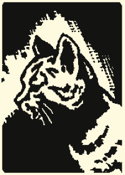
I had a swell cat story for this spot but "Whiskers" my dog blue penciled it.
HIGRADED
By special wire to the Los Angeles Examiner
GIANT RABBIT KILLED
COW ISLAND, Mont., Oct. 13—Joe Sage Hen, A Gros Ventre Indian, scared up a giant 15½-pound jack rabbit and promptly blasted the critter with a buffalo gun.
![]()
The Smithsonian Institution reveals that there is 45 trillion dollars' worth of gold in the ocean, but we don't suppose it will comfort a seasick guy much to know he's rolling in wealth.
![]()
Old Wiffletree, ex-stage coach driver, was asked by an old sister "Do you like romantic old ruins?" His quick retort was, "Might if they'd only stop asking to marry me."
![]()
REMEMBER
The above is one of 4 posters (16x24 inches) from my 21 acre Old West Mining Camp "GOLD GULCH" at the San Diego Exposition, 1935.
Your Editor is trying to find copies of all 4 of these and will pay for them if any of you collectors have them, I am also trying to find one of the CIGAR BOXES my cigar maker used, "OLIVER TWISTS"—"Outdoor Seegar" of Gold Gulch.
If you have ny of this stuff let me know.
DESERT TEA
One pound one dollar postpaid
GREASEWOOD GREENHOUSES
Lenwood, Barstow, California
LOST DESERT GOLD
By Ralph L. Caine
The Pegleg and Other Lost Mines
Geology, Photos, Maps of "Pegleg Country"
$1.10
P.O. Box Foy Sta. 17162
LOS ANGELES CALIFORNIA
For Tales and Trails
of the Desert West Read the NEW
CALICO PRINT
Magazine
Published Every Other Month
Lost Mines, Ghost Towns, Humor, Geology,
Gems, Minerals, History, Folklore, Wildlife of
the Desert West
Edited by Harold and Lucile Weight
29 Palms, California
One Year—$1.50 Single Copy 30c
The Withering Winds of the Mojave Desert
The gang around the SNOW CREEK BAR were engaged in a discussion of the effect of wind on matter; finally Philosopher Phil told us of his experience with the shrinking woods in the drying winds of the Mojave.
"Some years ago," he went on, "I found an old abandoned mine in the foothills of the High Sieras, and decided to work it by myself. I got some green lumber from the pine forests, split them into 8 inch boards, hauled them to the spot, and started to build. I had brought a goat with me to provide me with milk, as there was a nice cool spring with grass growing around it, and I staked him out there. I built the shelter near it standing the boards upright, nailing them to a cross piece at the top. When I got it completed, I went back to town to work, as I had to earn enough to buy my grub stake, and came out week ends to work the mine. And each weekend that I came out, I noticed that the boards were 1 inch narrower. This continued for 7 weeks, at which time the boards were only 1 inch wide, and the space between them 7 inches wide. The next week end I was forced to remain in town, and did not get out there until the week after.
"As I approached the place, I was aware that something was wrong, as there was evidence that a terrific wind had swept the area. I had counted on getting out of the hot noonday sun, and resting in the shade of the shelter. Not only had the withering wind shrunk the boards to nothing, but all that remained of the shelter was the shadow of the corner uprights and cross beams."
"Wait a minute," cut in one of the gang, "you say the boards and posts had disappeared entirely; then how could they cast a shadow?"
"That," replied Phil, nonplussed, "is something that only the old denizens of the desert can understand. Even after a thing has ceased to exist, he still can see the shadow of what it was.
"I went round to where the door used to be and knocked, but got no response, only the wierd shriek of the wind as it whistled through the knotholes, or rather, where the knots used to be, only now they were all hole and not knot. I went round to the other side, and as I rounded the corner I stopped, amazed at the sight I beheld. Some time previously, I had erected a sign board pointing toward Los Angeles, but I had made it of a 2-inch plank of ironwood, which does not shrink in the wind.
"Plastered up tight against the board was my goat, where the wind had blasted him and held him there while he starved to death; the hot sun had melted the glue in his bones and glued him tight to the board, and the wind had driven his hair right through the board into a clearly defined outline of the goat, even to his goatee. Even his horns had been curved over the top of the board so that the tips came where the roots should have been.
"I picked up my tools and beat it back to town, and have never gone there since. And I think I am very lucky."
"How do you figure you were lucky, Phil, you lost everything?" one asked him.
"Sure I lost everything," he replied, "but suppose it had been me that wind had blown against that board; think how I would look, my scrawny bones glued on one side, and nothing but the narrow fringe of hair below my bald head on the other side. Boys, I am lucky."
The gang quaffed their beer in silence, then wandered out into the darkness of the night to ponder the mysteries of the desert.
Snow Creek Bert
Only One World Famous
VALERIE JEAN
DATE SHOP
11 Miles South of Indio on Highway 99
or Please Mail Your Order
1-lb. Finest Dates and Confections, $1.30
3-lbs. Finest Dates and Confections, $3.50
Including Delivery — write for Folder
VALERIE JEAN DATE SHOP
Thermal, Calif.
Be a One Page DESERT NATURALIST 5
I find many Imperial Valley folks can tell a sweet potato from a yam.
• • •
Burbank talked God out of putting stickers on some kinds of cactus.
• • •
Camp Note:—Put popcorn in your flapjack batter—watch them flop over by themselves.
• • •
Horned toads live in perfect accord with rattlesnakes, prospectors, desert rats, birds and tourists.
• • •
Each rattlesnake helps man by killing off between 100 and 150 rats, mice, gophers and ground squirrels every year.
• • •
The Black Widow spider is so-called because she spends most of her life as a widow.
She eats her husband soon after the wedding.
• • •
The desert smoke tree has promised companionship to many a desert wanderer.
It the desert's one mirage that's always at work (a mock camp-fire).
• • •
Nature's protection for helpless little fawns—is that they have no odor or scent—
dogs can smell a bear or wolf a mile away, but will pass a fawn and not know it.
• • •
"Paisano" — meaning fellow citizen—is the Mexican name for our desert Road Runner.
New Mexico has made him its state bird.
(No one could possibly think of a Road Runner as a she.)
• • •
Ticks are left hand thread (very seldom right hand threaded).
• • •
We cigarette and pipe smoking folks should give a though to how we must smell to a SKUNK.
• • •
 The wildest thing in the Wild West is a mother burro, if her baby's safety is at stake.
The wildest thing in the Wild West is a mother burro, if her baby's safety is at stake.
• • •
The needles of the prickly pear cactus are cut to size, shaped, polished and sold as phonograph needles.
• • •
Horned Toads sometimes lay eggs and other times will give forth living young. It seems that the mother can't quite make up her mind.
• • •
Half a million snakes and twice that number of lizards were killed for their skins and turned into shoes and purses last year, for milady's fancy.
• • •
Thousands of years before man began to have afternoon headaches from trying to think, the desert tortoise had a streamlined body, turret top, retrectable landing gear, and a portable house.
• • •
Many old prospectors have been saved from thirst by the water contained in the famous barrel cactus. Today this cactus furnishes the base for some of the noted cactus candies.
• • •
Wrinkled inhabitants of the desert shake their heads and whisper startling exaggerations when you ask about the Jumping Cactus (Cholla) nevertheless it does jump, but only when stirred by the swish of your pant leg or coat sleeve.
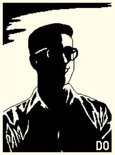
All text was hand-entered (no OCR scans) by Dick Oakes who did the layout, markup and graphics reproduction (all of Harry's misspellings retained). The contents remain the property of Bill Lincoln and his heirs.

